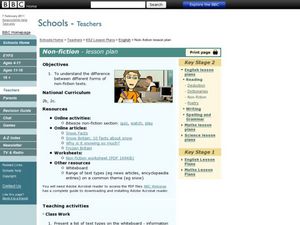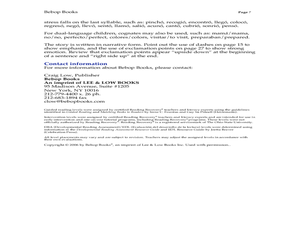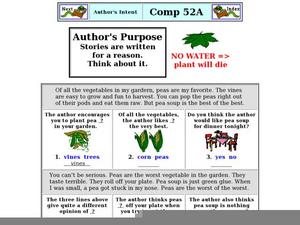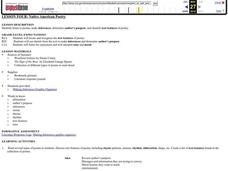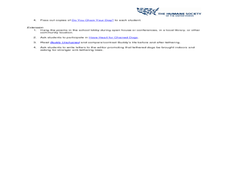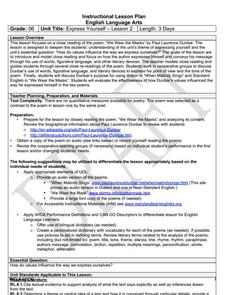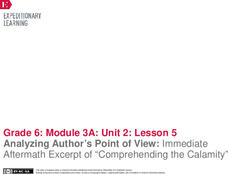EngageNY
Considering Author’s Purpose: Comparing Fictional and Historical Experiences of the Second Sudanese Civil War (Chapters 14 and 15, Plus Rereading “Time Trip,” Continued)
Is that a true story? Readers work to gather evidence for comparing the historical and fictional text Time Trip: Sudan’s Civil War and A Long Walk to Water. Scholars identify the use of real people and experiences versus the use of...
Curated OER
At Play Long Ago and Today: comprehension skills
In this comprehension skills worksheet, students read the book At Play Long Ago and Today and complete comprehension activities. Students complete 5 activities including note taking, compare and contrast, predicting, and author's purpose.
Curated OER
Non-Fiction Texts
Third graders examine different types of non-fiction texts. In this non fiction lesson, 3rd graders use different types of texts to gather information. Students work in groups to analyze the texts for author's purpose, common themes, and...
Curated OER
Author In The Spotlight
Complete an in-depth study of the works or a specific author. Working in pairs, students read at least four works by the same author. After completing the reading, they create an essay comparing and contrasting the works and create an...
Curated OER
Guided Reading with Elizabeti's Doll
Practice reading strategies using Elizabeti's Doll by Stephanie Stuve-Bodeen. Readers utilize decoding and comprehension strategies before, during, and after reading the story. A detailed list of text features, high frequency words,...
Curated OER
Brochure Writing
Have your budding authors evaluate various writing styles found in informational brochures. They look for effective writing, compare and contrast styles, and create an assessment.
Shmoop
ELA.CCSS.ELA-Literacy.RI.9-10.6
What does the author believe about his topic? Why did he write in the first place? Challenge your class to figure out the answers to these questions as they read through informational texts. The resource provides a breakdown of the...
Curated OER
Lesson 2: Identifying an Author's Purpose (part 2)
Keep reinforcing the concept of author's purpose with a practice activity. After discussing the three purposes of writing, third graders will complete a graphic organizer intended to help them pin point textual evidence that proves...
Florida Center for Reading Research
Comprehension: Text Analysis, Persuade, Inform, and Entertain Sort
Why do authors write? Practice determining the author's purpose with a categorizing activity. Learners sort twelve short passages into three categories: persuade, inform, and entertain.
Curriculum Corner
Informational Text Graphic Organizers
Scholars delve into an informational text with the help of four pages that focus on the author's purpose, vocabulary words, summarization, and main idea.
Curated OER
Lesson Skill: Determining Audience and Purpose
“. . . the car looked as it had caught some terrible disease.” Pairs read and then illustrate a passage from either “The Year I Drove through the Car Wash” or “Riding Is an Exercise of the Mind” in preparation for a discussion of...
Curated OER
Author's Day
Have your learners choose an author to study. One resource link gives a list of approved authors. Scholars read at least three works produced by that author and produce three separate book reports as well as a two-page author report....
Curated OER
Identify Author's Purpose
In this author's purpose worksheet, students complete a graphic organizer, writing clues that help determine author's purpose in an essay: explain, express feelings, persuade or entertain.
Curated OER
Author's Purpose
Determining an author's purpose can help readers understand a text more deeply. Using a PIES chart (persuade, inform, entertain, share) and poems from Leaf by Leaf: Autumn Poems by Barbara Rogasky, class members organize lines that show...
Curated OER
Author's Purpose
Students discuss and define what folk and fairy tales are. In this literature lesson, students construct their own working definitions for folk and fairy tales. Students choose to work as a class or in cooperative groups. Then students...
Curated OER
Author's Purpose and Point of View Post Test
For this author's purpose and point of view worksheet, students determine the definition of the terms and identify the author's purpose and point of view in given passages.
Curated OER
Identify Purposes of Text
Set a purpose for reading informational texts with this reading lesson. To find the central idea of a text, young readers turn titles and subtitles into questions to help them understand the text. They complete a T-chart for the lesson,...
EngageNY
Grade 11 ELA Module 2: Unit 2, Lesson 2
How did Elizabeth Cady Stanton advocate for women's rights? Pupils consider this question as they continue reading "An Address by Elizabeth Cady Stanton." They complete a Quick Write, analyzing how satire and sarcasm advance the author's...
Curated OER
Author's Intent
In this author's intent worksheet, students read two short stories about vegetables. Students answer 9 short answer questions about the author's intent or purpose.
Curated OER
Native American Poetry
Identify text features, make inferences, and discover the cultural significance of Native American Poetry. Sixth graders read several Native American poems and use graphic organizers and literature response logs to record their feelings...
Curated OER
Find The Hidden Message: Media Literacy in Primary Grades
Learners practice listening to and reading various types of media and text. In groups, learners use video, newspapers, magazines, and more to compare and contrast different types of information. They identify the differences between fact...
Curated OER
Poetic Justice: Understanding the Life of a Tethered Dog
The Humane Society provides a lesson in which class members explore the issue of tethering dogs. Through the resources used -- a comic, a poem, and narrative and expository writings -- class members realize that messages can be conveyed...
Curated OER
6th Grade: Express Yourself, Lesson 2: Close Read
The second lesson plan of a pair about Paul Laurence Dunbar, this plan focuses in particular on his poem, "We Wear the Masks." After a short historical introduction, class members conduct a series or readings, marking up the text and...
EngageNY
Analyzing Author’s Point of View: Immediate Aftermath Excerpt of “Comprehending the Calamity"
Analyze that! Scholars continue reading and analyzing a primary source about the immediate aftermath of the 1906 San Francisco fire and earthquake. Then, individuals use graphic organizers to identify the author's point of view.
Other popular searches
- Authors Purpose Powerpoint
- Authors Purpose Mini Lesson
- Authors Purpose Passage
- Teaching Author's Purpose
- Main Idea Authors Purpose
- Teaching Authors Purpose
- Authors Purpose Persuade
- Authors Purpose for Writing
- Identify Authors Purpose
- Author's Purpose to Inform
- Authors Purpose to Entertain
- Identifying Author's Purpose




